
MAMAS #pressforprogress: Thóra Arnórsdóttir and Commissioner Natalia Macker on International Women's Day
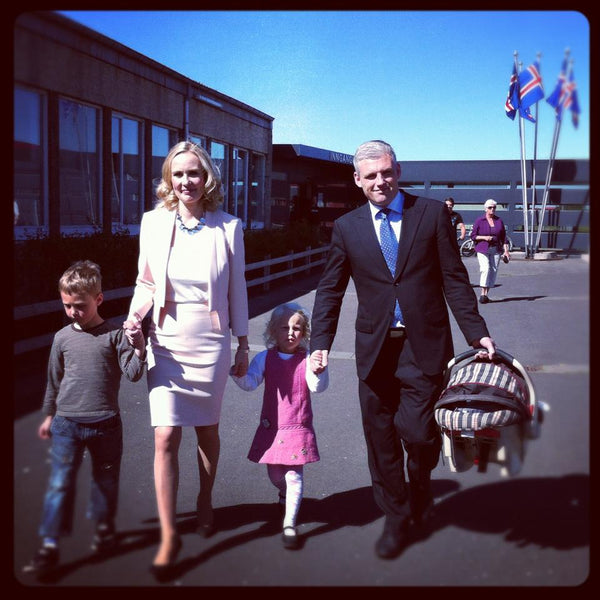
Hi Mamas,
Happy International Women's Day to all of you! What better way to celebrate today than to highlight two amazing and VERY inspiring #MiteraMamas who both ran for public office shortly giving birth. These women are leading by example in both their personal and professional lives but continue to #pressforprogress for women's rights and to change the status-quo to make this world more equitable.
At Mitera, we are firm believers that motherhood does not take away from a woman's identity, but rather adds to it; making us even stronger and more resilient, passionate and compassionate, more purposeful and resourceful than ever before. These two #MiteraMamas are a great testament of that and we are so excited to hear their perspective on what International Women's Day means to them and what it means and takes to be a successful female leader in our society today.
Thóra Arnórsdóttir
Iceland is not only famous for its incredible natural beauty like the thermal baths and water falls but the country is also known for its leadership role in advancing women's rights. As of 2017, for the seventh year running, Iceland has topped the World Economic Forum’s survey for gender equality. So, it is so fitting that we had the privilege to interview Thóra Arnórsdóttir, a renowned Icelandic media personality (currently the managing editor of Kveikur, an investigative journalism program on Icelandic National TV), a 2012 candidate for the presidential election and a documentary film producer. Though she missed the presidency by a narrow margin, along with her husband, Thora sparked international debate on gender roles and equality: she was 8 months pregnant with her third child when she announced her candidacy and ran an effective campaign later with a newborn. She is now a mother of three children, ages 12, 9 and 5 and step-mother to three stepdaughters, age 18, 19 and 20. The oldest one has moved to London, but the others live with her and her husband in Reykjavik, Iceland - they have a household of ten: seven humans, two cats and a parrot. She has a B.A. degree in philosophy from the University of Iceland, an MA degree in international and development economics from the Johns Hopkins University Paul H. Nitze School of Advanced International Studies, Bologna, Italy, and Washington, DC, USA. She was also a 2014 Yale World Fellow.
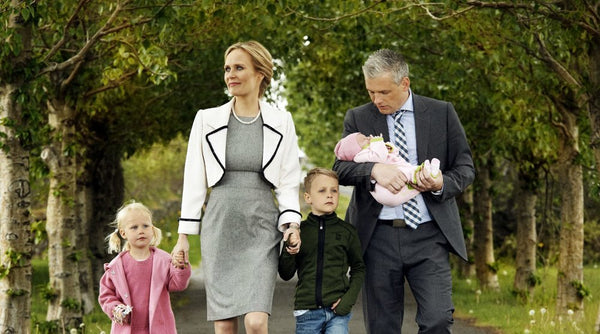
Thora Arnorsdottir on her campaign trail
1. What does International Women's Day mean to you as a mom?
I would not have believed the incredible expansion of fields in my brain that came with it. The ability to organize and keep oversight with uncountable tasks simultaneously, emotional insight and of course the love that will make you capable of doing almost anything. It also sparked a longing to improve the world and the society that my children grow up in.
In Iceland, we have a very old tradition of celebrating Women’s Day in February. In addition, we celebrate Mother’s day in May and another Women’s day on June 19. Icelandic women got the right to vote on that day, 1915. We also celebrate October 24th, because in 1975, women in Iceland went on strike. We still walk out early on that day to remind society of the pay gap. I only found out when I moved abroad that March 8th was International Women’s Day. I realize that I’m privileged, though, growing up in a country where there are so many days to celebrate women and their fight for equality.
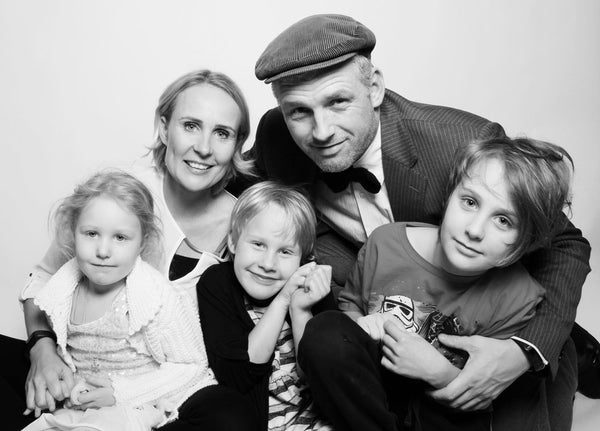

2. In what ways do you feel that becoming a mother empowered you as a woman?
Where to begin? My life is divided into before-and-after I became a mom. I would not have believed the incredible expansion of fields in my brain that came with it. The ability to organize and keep oversight with uncountable tasks simultaneously, emotional insight and of course the love that will make you capable of doing almost anything. It also sparked a longing to improve the world and the society that my children grow up in.
3. What barriers have you faced, as a woman, in becoming successful in your field? How did you overcome them? What do you see might be lacking in terms of supporting women and in particular moms to thrive and succeed in your particular field? What changes do you think need to happen in your workplace for women, in particular mothers, to succeed?
We need higher salaries and more flexibility during the years in your career when child-raising is most demanding. The pay gap needs to be closed and men need to get their act together in the home.
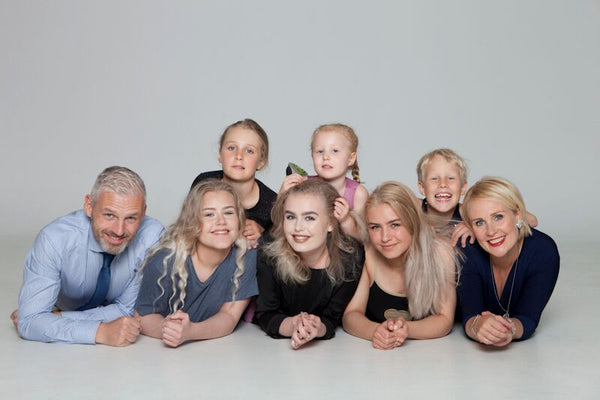
Now that I’ve reached a senior position I look around me and ask: Where are all the women? In a country where the misogyny is not as blatant and obvious as in many other places, it can be more difficult to put a finger on it. It’s subtler and reaches all the way into the homes. In journalism, work is very demanding and time-consuming. You will miss dinner and you can’t pick up kids from pre-school every day. In the last few years I’ve seen a whole group of experienced and promising female reporters quit and leave for more comfortable (boring), better-paying jobs with more family-friendly working hours. Why do they leave and not the men? Well, in general, they carry a bigger share of the household chores and are the main caregivers. It’s their responsibility to keep the family running, and they usually earn less than their male partner. We need higher salaries and more flexibility during the years in your career when child-raising is most demanding. The pay gap needs to be closed and men need to get their act together in the home. They often have a demanding job as well, so women should not hesitate to hire assistance in the home during this period. Otherwise there is a serious danger of burnout. It’s difficult to say why I have endured and succeeded. I grew up with four big brothers and know how to fight for my right. It’s not always been easy, but I have thick skin, good education and an inner conviction that I can do what I decide I want to achieve.
4. What are some strategies you’ve learned that can help women achieve a more prominent role in their organizations?
Get rid of the constant self-doubt and self-criticism. Do your absolute best at every task and build on that. Co-operate and network. Improve your skills, embrace new technology in your field – don’t let the men get ahead of you there – enjoy your work and know your boundaries.
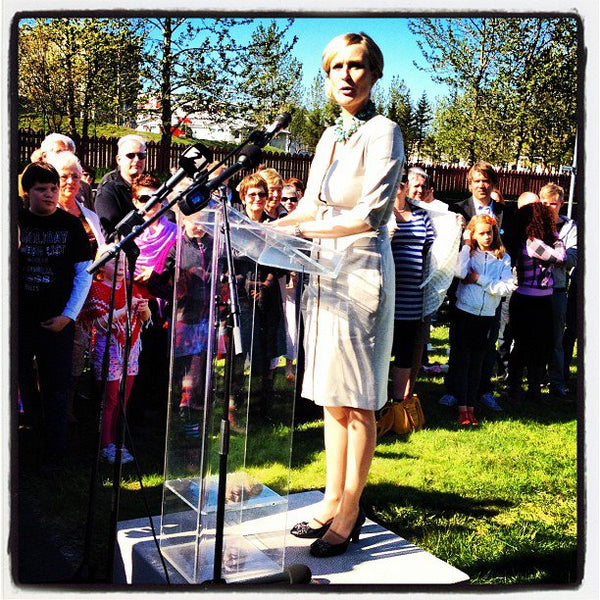
Thora on her presidential campaign
Get rid of the constant self-doubt and self-criticism. Do your absolute best at every task and build on that. Co-operate and network. Improve your skills, embrace new technology in your field – don’t let the men get ahead of you there – enjoy your work and know your boundaries. Plus the obvious: Apply and let it be known that you’re interested in a more prominent role. I’ve heard many stories of women that were boycotted and when they asked why they didn’t get the promotion, the answer was: “We thought you weren’t interested, I mean you have small children to take care of…”
5. What are some of your self-care practices to keep you grounded and happy?
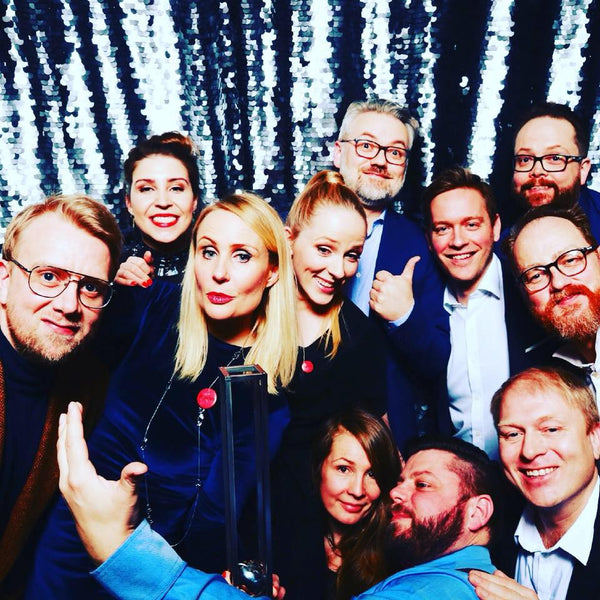
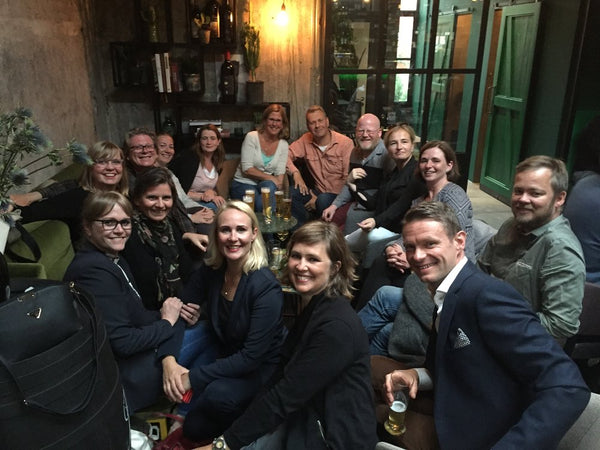
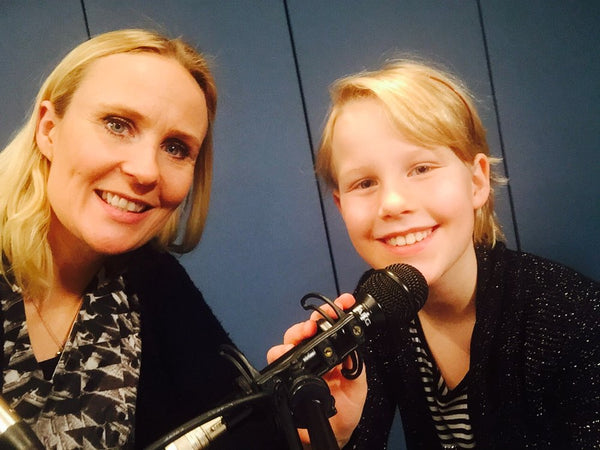
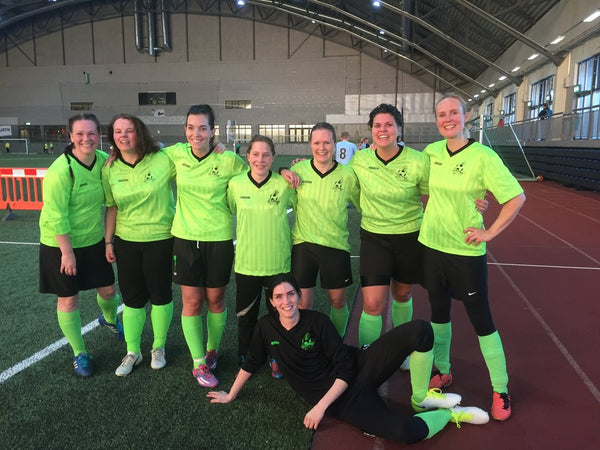
Friends are of the essence. It‘s absolutely vital to make time to meet friends and share your life with them. With and without kids. I play soccer twice a week, which is also a life saver. Many moms quit reading books and turn to Netflix. I was always a vivid reader and decided a few years ago to get back to books. My goal is to read 50 books a year in at least 4 languages and I’ve managed to keep that. (Just barely, though, and it’s not all world literature!). You get better sleep and create new connections in the brain. What makes me most happy, though, is watching my kids grow up to be good people that are fun to be with. I’m very aware of the fact that we spend a much longer time with our children as grown-ups than as children, but the quality of that time is defined by the childhood we give them. I’ve also found it very important to go on a long vacation together, where I can quit thinking about work and just hang out with the family, discovering new things and places together.
Next, we talk to Commissioner Macker. Natalia D. Macker is the County Commissioner at Teton County, Wyoming. She is a mom of 2 boys - Alisdair (“Al”) is almost 4 and Lockwood (“Woody”) is just 7 weeks!
At Mitera, we are so fortunate to get to know so many customers who are as accomplished in their careers as they are in their role as moms. We recently met Commissioner Macker, who is a member of the Teton County Board of County Commissioners and a mother of two boys (4 and 7 weeks). She is passionate about and is actively working to change the status-quo for issues such as support for the working families, a commitment to public lands and Teton County's conservation values. Similar to Thóra, she first ran for office for the first time in 2014 when her son was a newborn. Commissioner Macker lives in Hoback with her husband and two boys. She is a graduate of Leadership Jackson Hole, a member of the Young Elected Officials Network and holds a BA cum laude from Yale University.
 Family photo from Natalia's 2016 campaign (Photo credit David Swift)
Family photo from Natalia's 2016 campaign (Photo credit David Swift)
1. What does International Women's Day mean to you as a mom?
When I was pregnant with both of my sons, one of the books I read in preparation for labor referenced that on the day when you are giving birth, 350,000 other women around the world are also giving birth (not sure if that is the exact number, but something close to that!). I was to know that I wasn’t alone in becoming a mother and to draw on that collective strength as I was undertaking the challenge, joy, and pain of childbirth. International Women’s Day is a reminder that we have each other’s backs. It’s being at the grocery store with a wild and crazy 3 year old and making eye contact with another mom and being able to smile. It’s having female friends without kids willing to watch mine so I can go to a meeting. It means that rights for women and children are worth fighting for.
2. In what ways do you feel that becoming a mother empowered you as a woman?
 Natalia and Lockwood right after he was born
Natalia and Lockwood right after he was born
This is a tough one because sometimes the responsibility of parenthood has meant limitations. I think the biggest transition of parenthood, which I hope is true for men and women, is a transition of ego. A shift from the focus being on me and what I want to being on my children and what I want them to learn from my words and actions. I’m sure this will shift again as they grow. And it’s not easy. Becoming a mother has definitely strengthened the courage behind my convictions and changed my awareness of political issues, but it has also introduced me to the profound power of love. In an effort to empathize with my children, I’m reminded that we need our elected officials to empathize with the people the represent. We need to allow our elected officials to be human (which also means making mistakes and evolving over time, not forcing them to be one-sided puppets). I see this play out in my family life, and I hope I bring that to work.
Surprisingly to me, I’ve also been empowered to try focus on what really matters to me and to my family and worry less about what people think about me (nothing like a post-baby belly!). I certainly struggle with this, and I think a lot of women do, especially when you become a mom but want to make sure that you don’t give the impression that you can’t do all the things you used to do. I catch myself sometimes trying to be everything to everyone. So I guess as a woman, it almost took me becoming a mom to be empowered to say no!
I ran for office for the first time (2014) with a newborn , and I got asked all the questions you can imagine would come up. How would I have time? Didn’t I really just want to stay home? Who would take care of my baby? What did my husband think of me working so much?
3. What barriers have you faced, as a woman, in becoming successful in your field? How did you overcome them? What do you see might be lacking in terms of supporting women and in particular moms to thrive and succeed in your particular field? What changes do you think need to happen in your workplace for women, in particular mothers, to succeed?
I ran for office for the first time (2014) with a newborn , and I got asked all the questions you can imagine would come up. How would I have time? Didn’t I really just want to stay home? Who would take care of my baby? What did my husband think of me working so much? Etc. I used to think that to be successful in public life I had to present myself more like a man and insert myself into the male spheres of power. Now, I think the better strategy for me, and for women generally, is to focus more on broader participation and creating our own spheres of power. We’ve always done this, although we may not always have translated into arenas that have been male dominated, and more traditionally “power” realms. Rather than trying to be the only woman at the table, I want a table full of women.
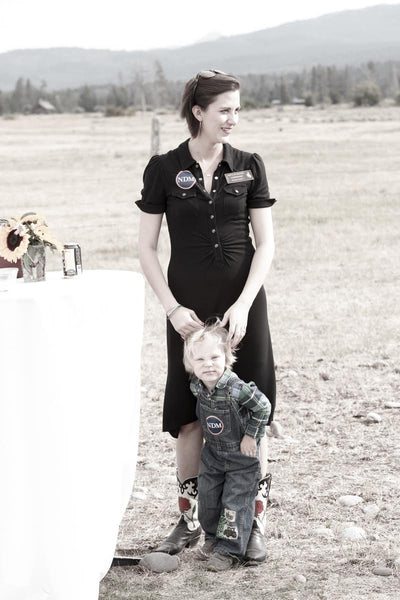
Natalia and her son, Alisdair at a campaign event, Summer 2016 (Photo credit David Swift)
Another issue that came up during my campaigning and sometimes even during my service is the idea that I have to downplay my successes. I think for my generation (I’m 33) it hasn’t been that I thought I couldn’t pursue a particular line of work. I’ve certainly felt I could do anything I wanted. The issue has been more of what the costs of pursuing certain things would be. Rebecca Solnit describes this beautifully in her piece “If I Were A Man.” On the campaign trail, one thing I avoided telling people was where I went to college (Yale) because the feedback I got was that I thought I was better/smarter/fancier than “regular” people. I shared this with a male counterpart who is also an elected official. He was surprised that I was even asked that question, because he hadn’t even been to college. Point made. This also pretty much sums it up.
As far as public office goes, I am very fortunate to have a supportive community. And despite commissioners across my state being predominantly male and most over 50, I have often been surprised by their inclusion of me as a young women. An advantage of being one of few women is that it can be easier to be involved since there is a desire to have a diversity of experiences represented, even if we don’t have that diversity in our elected officials. So I’ve had to overcome some fears of not knowing everything – which is one of the reasons women don’t run for office – but also one of the primary fears of motherhood so that’s helped me! I’ve had to learn to beat back the nerves and do as Eleanor Roosevelt – You must do the thing you think you cannot do. I have the honor of being a parent to a differently-abled child – my newborn was born without his right hand and part of his forearm. We are still processing what this means but even in just a few weeks I know that my future public policy work will likely be shaped by this experience as well.
I’ve had to learn to beat back the nerves and do as Eleanor Roosevelt – You must do the thing you think you cannot do. I have the honor of being a parent to a differently-abled child – my newborn was born without his right hand and part of his forearm.
Serving in local office is also easier than in a state legislature or Congress because I don’t have to travel as much. The pay for different elected offices is certainly a challenge as well. In Wyoming, we have a citizen legislature. Not many women with young kids can afford to take 2-3 months off work, and that’s assuming they have a job that would allow them to. But honestly, some of the structural changes we need are actually the easy part because we know what they are and we just need the courage to enact them. (family friendly workplaces, paid maternity and paternity leave, less expensive daycare & universal early childhood education, wage transparency etc. And by the way, these things are great for the dads too!) What’s more challenging is changing the mindset of our society and the norms of what women in leadership look like. We also need to find a way to value what parenting is as a society. Isn’t raising our next generation the highest and best use of someone’s time? Research has proven that a female candidate with young children faces the highest level of scrutiny, and often that is from other women. So perhaps a first step is for us to support each other. Oh, and tell the women in your life that they should run for office (she’ll need to hear it at least 3 times), and then help her do it.
I just had a baby, and I was serving in public office during my pregnancy. Towards the end, I remember thinking – gosh I hope my water doesn’t break in a meeting. I shared this concern with a friend and she said wouldn’t it be great if you didn’t have to worry about that because the room was full of women! I want to be clear that I have been blessed to have very supportive men in my life, starting with my husband. And as the mother of two boys, I am profoundly interested in redefining what equality truly looks like (especially since I live in the equality state). I want my kids to have the freedom not to be defined by traditionally male roles either. I’d like to think that it won’t take 250 years of female presidents to get there, but it might. And would that really be so bad?
4. What are some strategies you’ve learned that can help women achieve a more prominent role in their organizations?
It won’t be a surprise that mentorship is at the top of my list. It’s also important that we not only look for female mentors (because for many of us, there might not be a female in the leadership position) but that we look for male mentors as well. I would also say a close group of confidantes outside the organization that you can turn to is critical. I have friends that I can call and vent for 10 minutes to get everything off my chest. Then hang up, calm down, and call them back to build a strategy to overcome the hurdle. That leads me to probably my best suggestions – ask for help when you need it. Even if you think your boss will say no, ask for what you need. In my own journey, I think I’ve thought that if I couldn’t do it on my own, I somehow didn’t deserve to be there. Nothing could be further from the truth. Not only does it make my job harder, it makes it harder for the women who come after me. We can’t pretend that we can do it all on our own. For me, this means I sometimes bring my baby to work ! For those of us in leadership positions, the more we can be transparent about the challenges, the more likely we are to generate change and make it ok for others. It’s easy for the general counsel to bring her kid to work one day when he’s home sick, not so easy for the GC’s assistant. But the assistant is the one more likely to need to for many reasons, the main one being she probably can’t afford to take the day off.
We also need to find a way to value what parenting is as a society. Isn’t raising our next generation the highest and best use of someone’s time? Research has proven that a female candidate with young children faces the highest level of scrutiny, and often that is from other women. So perhaps a first step is for us to support each other. Oh, and tell the women in your life that they should run for office (she’ll need to hear it at least 3 times), and then help her do it.
I also love to collect inspirational quotes and put them around my various work areas. My current favorites are below. (These were also inspirational for labor…)
· audentes Fortuna iuvat – Fortune favors the bold!
· “You gain strength, courage and confidence by every experience in which you really stop to look fear in the face. You are able to say to yourself, 'I have lived through this horror. I can take the next thing that comes along.' You must do the thing you think you cannot do.” Eleanor Roosevelt
· RISK – Anais Nin
And then the day came,
when the risk
to remain tight
in a bud
was more painful
than the risk
it took
to Blossom
Ask for help when you need it. Even if you think your boss will say no, ask for what you need. In my own journey, I think I’ve thought that if I couldn’t do it on my own, I somehow didn’t deserve to be there. Nothing could be further from the truth. Not only does it make my job harder, it makes it harder for the women who come after me. We can’t pretend that we can do it all on our own. For me, this means I sometimes bring my baby to work !
5. What are some of your self-care practices to keep you grounded and happy?
Exercise – Thursday mornings at 8 is my time!
Unplugged time – I try not to let the infinite of the online world invade my life too much. Easier said than done.
Giving full attention to kids and doing an activity with them (aka baby therapy! Nothing beats a tough day like a good smile/giggle session with my kids)
Setting boundaries – one of the best things I’ve learned as a mom is how to say no!
